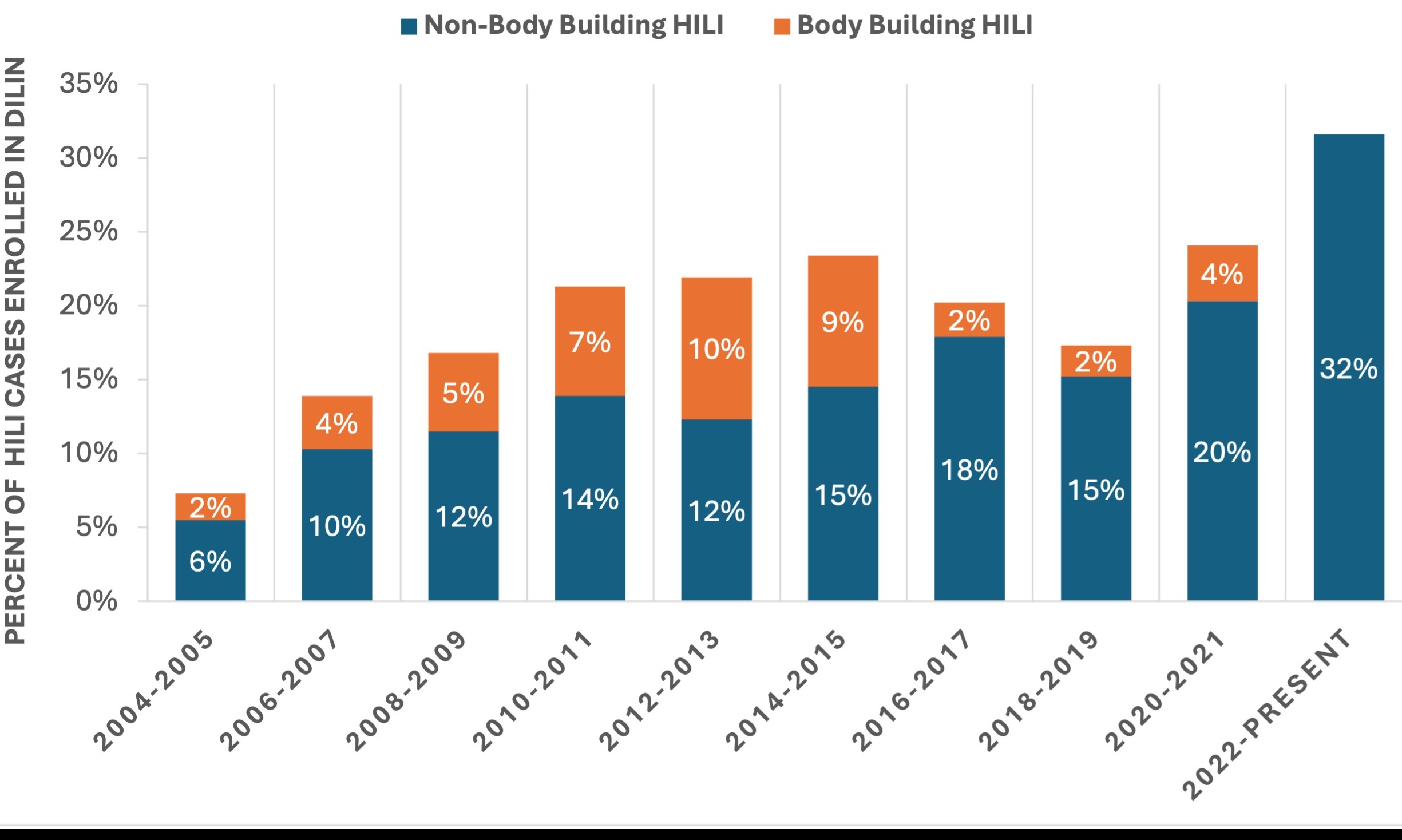Oral Paper Presentation
Annual Scientific Meeting
Session: Plenary Session 4A - Liver
59 - A Recent Epidemiologic Shift in Herbal and Dietary Supplement-Induced Liver Injury: Two Decades of Experience From the U.S. Drug-Induced Liver Injury Network
Wednesday, October 30, 2024
9:10 AM - 9:20 AM ET
Location: Terrace Ballroom 1

Dina Halegoua-DeMarzio, MD
Sidney Kimmel Medical College at Thomas Jefferson University
Philadelphia, PA
Presenting Author(s)
Dina Halegoua-DeMarzio, MD1, Victor Navarro, MD2, Huiman Barnhart, PhD3, Herb L. Bonkovsky, MD4, Robert Fontana, MD5, Paul Hayashi, MD6, Christopher Koh, MD7, Alisa Likhitsup, MD5, Jose Serrano, MD, PhD7, Andrew Stolz, MD8, Raj Vuppalanchi, MD9
1Sidney Kimmel Medical College at Thomas Jefferson University, Philadelphia, PA; 2Thomas Jefferson Health, Philadelphia, PA; 3Duke Clinical Research Institute, Durham, DE; 4Wake Forest University School of Medicine, Winston-Salem, NC; 5University of Michigan Medical School, Ann Arbor, MI; 6FDA, Silver Spring, MD; 7National Institutes of Health, Bethesda, MD; 8Keck School of Medicine of the University of Southern California, Los Angeles, CA; 9Indiana University School of Medicine, Indianapolis, IN
Introduction: Herbal and dietary supplements (HDS) are being used at an increasing rate, which has mirrored an increase in cases of HDS induced liver injury (HILI) in the U.S. There are challenges in the identification and prevention of HILI due to its varying presentations, variety of responsible ingredients, and lack of regulatory oversight. The Drug-Induced Liver Injury Network (DILIN) has been conducting a prospective study of patients with liver injury due to medications or HDS since 2004. The aim of this study is to report trends and outcomes of HILI over the last 2 decades.
Methods: Patients were enrolled into the DILIN prospective study when presenting with liver injury due to medications or HDS and with serum ALT or AST ≥5 times normal, or alkaline phosphatase ≥2 normal; or total bilirubin ≥2 mg/dL. Causality was adjudicated using a structured expert opinion assessment. If available, HDS was collected for chemical analysis. HILI cases were grouped as due to bodybuilding (BB) or non-bodybuilding (non-BB) HDS based on purpose for use.
Results: Among the 1873 high-confidence cases (definite, highly likely or probable) that were enrolled between 2004 and April 2024, 360 (19%) were attributed to HDS. Since 2010, the number and proportion of enrolled BB-HILI cases decreased (p < 0.001) with no cases seen in 2023 (Figure 1). Among 13 potential known hepatotoxic ingredients of HDS, the 3 most frequently implicated were green tea (n=89), turmeric (n=38) and Garcinia cambogia (n=24). Over time, the frequency of turmeric as a suspect ingredient in HILI cases increased markedly. BB-HILI occurred almost exclusively in men (97%), compared with non-BB HILI (38%) and non-herbal DILI (39%). Non-BB HILI was associated with a higher rate of Latinos (20%), compared to BB-HILI (11%) and non-herbal DILI (8%). None of the 80 BB-HILI cases died or required liver transplant (LT), compared to 24 (9%) of non-BB-HILI cases (3% deaths; 6% LTs) and 158 (10%) of drug cases (7% deaths; 3% LTs) (p = 0.001). The predominant signature of HILI presentation was hepatocellular (37% for BB-HILI and 73% for non-BB HILI).
Discussion: HILI accounts for an increasing proportion of new DILI cases; up to one third of all cases enrolled into the DILIN prospective study in the most recent period. Among HILI categories BB HILI has virtually disappeared with non-BB HILI now predominating. Green tea extract is the most common ingredient implicated in non-BB HILI cases but with a rise in turmeric seen in recent years.

Disclosures:
Dina Halegoua-DeMarzio, MD1, Victor Navarro, MD2, Huiman Barnhart, PhD3, Herb L. Bonkovsky, MD4, Robert Fontana, MD5, Paul Hayashi, MD6, Christopher Koh, MD7, Alisa Likhitsup, MD5, Jose Serrano, MD, PhD7, Andrew Stolz, MD8, Raj Vuppalanchi, MD9, 59, A Recent Epidemiologic Shift in Herbal and Dietary Supplement-Induced Liver Injury: Two Decades of Experience From the U.S. Drug-Induced Liver Injury Network, ACG 2024 Annual Scientific Meeting Abstracts. Philadelphia, PA: American College of Gastroenterology.
1Sidney Kimmel Medical College at Thomas Jefferson University, Philadelphia, PA; 2Thomas Jefferson Health, Philadelphia, PA; 3Duke Clinical Research Institute, Durham, DE; 4Wake Forest University School of Medicine, Winston-Salem, NC; 5University of Michigan Medical School, Ann Arbor, MI; 6FDA, Silver Spring, MD; 7National Institutes of Health, Bethesda, MD; 8Keck School of Medicine of the University of Southern California, Los Angeles, CA; 9Indiana University School of Medicine, Indianapolis, IN
Introduction: Herbal and dietary supplements (HDS) are being used at an increasing rate, which has mirrored an increase in cases of HDS induced liver injury (HILI) in the U.S. There are challenges in the identification and prevention of HILI due to its varying presentations, variety of responsible ingredients, and lack of regulatory oversight. The Drug-Induced Liver Injury Network (DILIN) has been conducting a prospective study of patients with liver injury due to medications or HDS since 2004. The aim of this study is to report trends and outcomes of HILI over the last 2 decades.
Methods: Patients were enrolled into the DILIN prospective study when presenting with liver injury due to medications or HDS and with serum ALT or AST ≥5 times normal, or alkaline phosphatase ≥2 normal; or total bilirubin ≥2 mg/dL. Causality was adjudicated using a structured expert opinion assessment. If available, HDS was collected for chemical analysis. HILI cases were grouped as due to bodybuilding (BB) or non-bodybuilding (non-BB) HDS based on purpose for use.
Results: Among the 1873 high-confidence cases (definite, highly likely or probable) that were enrolled between 2004 and April 2024, 360 (19%) were attributed to HDS. Since 2010, the number and proportion of enrolled BB-HILI cases decreased (p < 0.001) with no cases seen in 2023 (Figure 1). Among 13 potential known hepatotoxic ingredients of HDS, the 3 most frequently implicated were green tea (n=89), turmeric (n=38) and Garcinia cambogia (n=24). Over time, the frequency of turmeric as a suspect ingredient in HILI cases increased markedly. BB-HILI occurred almost exclusively in men (97%), compared with non-BB HILI (38%) and non-herbal DILI (39%). Non-BB HILI was associated with a higher rate of Latinos (20%), compared to BB-HILI (11%) and non-herbal DILI (8%). None of the 80 BB-HILI cases died or required liver transplant (LT), compared to 24 (9%) of non-BB-HILI cases (3% deaths; 6% LTs) and 158 (10%) of drug cases (7% deaths; 3% LTs) (p = 0.001). The predominant signature of HILI presentation was hepatocellular (37% for BB-HILI and 73% for non-BB HILI).
Discussion: HILI accounts for an increasing proportion of new DILI cases; up to one third of all cases enrolled into the DILIN prospective study in the most recent period. Among HILI categories BB HILI has virtually disappeared with non-BB HILI now predominating. Green tea extract is the most common ingredient implicated in non-BB HILI cases but with a rise in turmeric seen in recent years.

Figure: Figure 1: Time trends of new HILI cases in DILIN. Decreasing proportion of BB HILI is noteworthy, with no cases in 2023.
Disclosures:
Dina Halegoua-DeMarzio: Akero – Grant/Research Support. Galectin – Grant/Research Support. Madigral – Advisory Committee/Board Member, Grant/Research Support. Novo Nordisk – Advisor or Review Panel Member, Grant/Research Support. Viking – Grant/Research Support.
Victor Navarro indicated no relevant financial relationships.
Huiman Barnhart indicated no relevant financial relationships.
Herb Bonkovsky indicated no relevant financial relationships.
Robert Fontana: Kezar Pharmaceuticals – Grant/Research Support. Takeda Pharmaceuticals – Grant/Research Support.
Paul Hayashi indicated no relevant financial relationships.
Christopher Koh indicated no relevant financial relationships.
Alisa Likhitsup indicated no relevant financial relationships.
Jose Serrano indicated no relevant financial relationships.
Andrew Stolz indicated no relevant financial relationships.
Raj Vuppalanchi indicated no relevant financial relationships.
Dina Halegoua-DeMarzio, MD1, Victor Navarro, MD2, Huiman Barnhart, PhD3, Herb L. Bonkovsky, MD4, Robert Fontana, MD5, Paul Hayashi, MD6, Christopher Koh, MD7, Alisa Likhitsup, MD5, Jose Serrano, MD, PhD7, Andrew Stolz, MD8, Raj Vuppalanchi, MD9, 59, A Recent Epidemiologic Shift in Herbal and Dietary Supplement-Induced Liver Injury: Two Decades of Experience From the U.S. Drug-Induced Liver Injury Network, ACG 2024 Annual Scientific Meeting Abstracts. Philadelphia, PA: American College of Gastroenterology.

